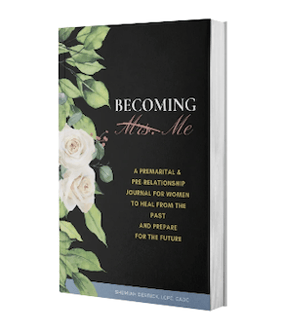Journaling to Cope with Divorce and Other Major Life Transitions

- Considering divorce journaling prompts
- Communication issues journaling prompts
- Divorce-related stress journaling prompts
- Parenting stress journaling prompts
- Navigating a major life change journaling prompts
- Embracing your post-divorce identity journaling prompts
- Divorce-related grief journaling prompts
- Divorce-related anger journaling prompts
Divorce has a guaranteed multitude of thoughts and feelings. Where do you put the thoughts when you feel too overwhelmed, sad, or ashamed to know what to say? How do you express the highs, lows, and everything in between when that’s changing moment by moment?
Your friend, sister, co-worker, a podcast, and maybe even your therapist might have already suggested journaling. Cool. But what does that mean exactly, and can simply writing really help?
Short answer: journaling helps almost everyone deal with stress. Keep reading to find out how it can help you.
What is journaling?
Simply put, journaling is an activity designed to help you process your thoughts and feelings. So why might this simple activity feel overwhelming? There are different approaches, and one involves no writing at all.
Traditional journaling
This open concept involves you, a pen or pencil, and paper. Free association. Just write what you think and feel and channel those “Dear Diary” days.
Guided journaling
Guided journaling can be as low-tech as pen and paper with a list of prompts, or as high-tech as an online journal or app. With guided journaling, you write responses to pre-determined questions or statements. The questions are typically written intentionally to guide you through a process or experience.
Bullet journaling
Not a writer? Bullet journaling combines writing words that express how you feel with images. Instead of full sentences and paragraphs, you might write a word, or at most, a sentence or two, and then draw an image that helps to tell the story of how you’re feeling. Other approaches let you simply mark a bullet under several items when it applies at that day or moment. If you are more of a creative type or fan of art therapy, bullet journaling may be a great fit for you.
Online journaling
Instead of writing on paper, online journaling is the equivalent of sending a text message or using the memo or note app on your phone. Penzu and Intelligent Change are two popular platforms that digitize online journaling.
Which type of journaling is best for me?
One technique is not better than the other. It’s a matter of preference ideally based on what’s easy and feels most beneficial to you.
What does matter is energy – the energy you have and bring to the process of journaling. Some feel you have to be in a quiet, solitary, intentional space to journal. For others, time and environmental constraints don’t allow for a serene setup so something shorter and on-the-go is just as beneficial to get out some quick expressions and prevent a buildup of emotions.
Read Shemiah’s blog about Riding Out the Divorce Rollercoaster of Emotions
How do I get started with journaling?
Channel your inner athlete and “just do it.” Don’t judge yourself or overthink. There’s no need to wait for the right time, perfect moment, best format, or for the sun, moon, and stars to align.
But to be fair, think about how you work best. Don't take "work" too literally. You want there to be a flow to this.
Start with the “when”
When are you the most introspective? Are there certain times of day you feel the feels more? If you're a busy parent, when do you have at least 10 minutes to yourself? Narrow down a couple of times you can designate for journaling.
Decide on the “how”
Refer back to the types of journaling. Which one feels interesting, the most doable, and not overly complicated? You don’t have to go with the most impressive option. Which one is the most "struggle-free" that you could do even when time and energy are low?
How long do I need to journal for it to help me?
Ah, the magical question: “For how long do I need to journal?” This varies widely from person to person. It may be a moving target as life shifts and moves. Writing for too long can feed into rumination. Dr. James Pennebaker recommends journaling for a max of 15 to 20 minutes for the first few days and assessing how you feel. Add or subtract as you feel is best for you. Even a few minutes can help.
Journaling for mental health
Numerous research studies have demonstrated the clear benefits of writing on both our mental and physical health. Journaling for mental health is a low-pressure option to add to your coping skills toolkit. While it doesn't replace counseling or seeing a licensed therapist, it is a valuable addition to your existing mental health/self-care plan.
Journaling can help you to continue making progress outside of therapy between sessions, or if you cannot go to therapy for whatever reason. There are so many angles to the end of a relationship or divorce that it can be overwhelming to know where to start. Journaling can help you organize what you want to focus on in therapy.
If you aren't in therapy, journaling is an awesome preparation tool. You may find there are several things you process on your own and clear out so when you begin therapy you have more clarity and more targeted focus. The University of Rochester Medical Center also notes that journaling can serve as a means for symptom and mood management by helping you prioritize feelings, track symptoms, and examine your cognitions or self-talk.
Mental health conditions that journaling can help with
While journaling can be beneficial for a variety of mental health conditions, most notably it can help with the following:
- Anxiety: Getting the thoughts that drive your anxiety down on paper and out of your head can reduce the intensity.
- Grief: Processing the loss of a loved one or cherished experience can be long, overwhelming, and complicated. Thoughts come and go and emotions vary from moment to moment. Journaling for grief helps you to process things little by little.
- Trauma: Like grief, trauma is multifaceted and complicated. A key part of addressing trauma is understanding and "making sense of it.” Because it's deeply hurtful and has had a negative effect, there is a tendency to avoid it. Journaling is a way for you to be in control and adjust the pace as you feel comfortable.
Journaling has also been studied concerning physical health. The Greater Good Science Center at UC Berkeley took a closer look at journaling and its effect on immune system health. When a group of undergraduate students who tested positive for the mononucleosis virus journaled about stressful events for 20 minutes three times per week, post-activity bloodwork showed an increase in antibodies against the virus compared to engaging in mundane writing. Science has shown us how powerful body chemistry is in impacting mental health and journaling is being recognized as an impactful resource.
.png)
Ready to re-discover yourself with coaching or therapy?
Our FREE checklist can help you find the right fit.
Download our checklist of questions to ask a potential therapist or coach today.
Journaling prompts related to divorce
Not sure where to start? Make it easy with journal prompts – questions or statements designed to make it easier for you to write and express yourself. Whether you're contemplating journaling or are a seasoned pro, here are a few prompts to consider:
Considering divorce journaling prompts
- What would it take to consider remaining in the marriage? What would have to happen and by when?
- Am I or my spouse willing to do whatever it takes to remain in the marriage?
- What are my boundaries and expectations in this marriage? Are they being honored or respected? Will they be respected in the future?
- Although it may be difficult to adjust to being single again, are there opportunities for joy, peace, or contentment?
Communication issues journaling prompts
- What are the ways we struggle to communicate and how can we improve regardless of the next steps with our marriage?
- Community is important in every aspect but what are the top three most important areas we have to be able to communicate with each other about?
Divorce-related stress journaling prompts
- What concerns me most about this process?
- How would I like to deal with divorce-related stress?
- What real-time, practical needs do I have and need support in? For example, if your spouse has handled a particular aspect of your household and you didn't have visibility or never got hands-on experience with it, what is it and what do you need to feel more comfortable or confident?
Parenting stress journaling prompts
- What do I want to maintain in the relationship with my children?
- What about my parenting makes me proud?
- What is the most important thing I want for my children throughout this process?
Navigating a major life change journaling prompts
- How do I view change?
- How am I emotionally approaching potential changes in the future?
- List the confirmed and potential changes to come. What are the realities and opportunities related to those changes?
Embracing your post-divorce identity journaling prompts
- What parts of my identity are changing post-divorce?
- What do I want to change and what do I want to maintain?
- How can I begin to process or separate ‘spouse’ from my identity on my terms and timeline?
Divorce-related grief journaling prompts
- List the stages of grief. Write about how each one has shown up as you navigate the divorce. If you haven't experienced them yet, how do you anticipate it will look or how do you want to express it when it comes up?
- What do I or what will I miss about my spouse,
Divorce-related anger journaling prompts
- Anger is considered a secondary emotion, meaning there are other emotions underneath the anger. List and write about those.
- Moment of truth. No judgment is allowed. Have you allowed yourself to be angry? What are you angry about?
Ready to start writing to begin your healing process? If journaling has been confusing or intimidating, I hope the above prompts or a guided journal help take some of the pressure off. Don’t worry about your writing skills – this is just for you. Just try it! Cliche but true, it’s about the process. I created a guided journal titled Becoming Me specifically for women to help process their experiences and clarify their needs during a divorce or breakup before getting into a new relationship.
Remember: although it may not always feel like it, the pain is temporary and will lessen. As you make more space for healing, it will eventually go away as your life opens up to new possibilities.




